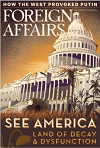The normal rhythm of politics tends to lead most nationsÕ economies around in a circle, ashes to ashes. This life cycle starts with a crisis, which forces leaders to reform, which triggers an economic revival, which lulls leaders into complacency, which plunges the economy back into crisis again. Although the pattern repeats itself indefinitely, a few nations will summon the strength to reform even in good times, and others will wallow in complacency for years — a tendency that helps explains why, of the worldÕs nearly 200 economies, only 35 have reached developed status and stayed there. The rest are still emerging, and many have been emerging forever. Beginning in 2003, however, this cycle seemed to stop turning. The world economy entered a unique period of prosperity, driven by declining interest rates, rising trade, and surging commodity prices. These global tail winds were so strong that national leaders did not need to push fresh reforms to generate economic growth; the fruit virtually fell from the tree on its own. By the peak of the boom, in 2007, roughly 60 percent of the worldÕs economies had hit annual growth rates of at least five percent, a record high number of economies and far above the 35 percent average of the postÐWorld War II era. Even more unusual, only five economies contracted that year. It seemed as if virtually every country was brimming with promise, and global investors poured hundreds of billions of dollars into emerging stock markets without bothering to distinguish one from the other, IndiaÕs from IndonesiaÕs.
Then came the financial meltdown of 2008; suddenly, the tail winds stopped blowing. By 2014, the percentage of the worldÕs economies that were growing at five percent or faster had fallen from 60 percent to 30 percent. The threat of crisis and recession returned with a vengeance, forcing investors to become much more discerning — and in an entirely novel way. Market players usually focus on and respond to data related to a nationÕs economic prospects: measurements of GDP growth, employment, trade, and so on. But given the trying economic climate, investors have lately started to train their gaze elsewhere: on political leadership. In recent years, stock markets in countries ranging from Japan to Mexico have rallied on mere hope for political change: specifically, the rise of new leaders who seem likely to push for economic reform.
RUCHIR SHARMA is head of Emerging Markets and Global Macro at Morgan Stanley Investment Management and the author of Breakout Nations: In Pursuit of the Next Economic Miracles.


